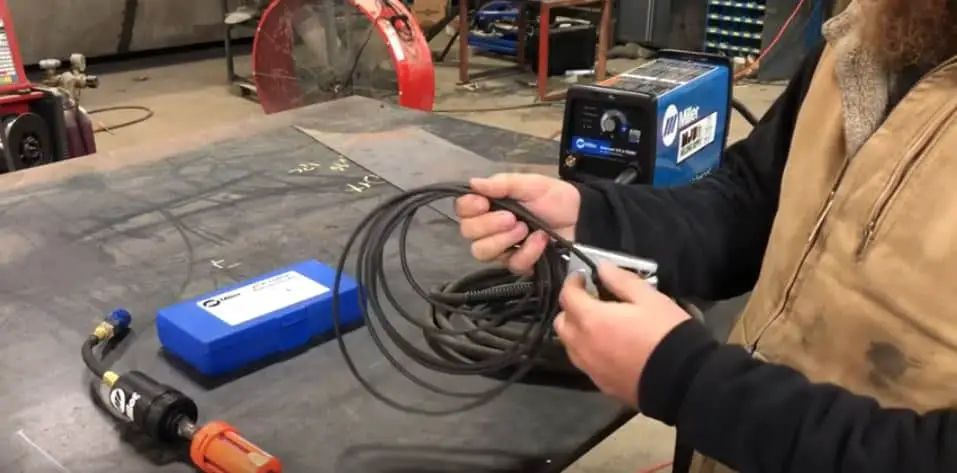Miller Electric Mfg. has been in the business of providing appliances for both personal and commercial/industrial uses since 1929. Throughout this long time-span, the brand has managed to emerge as one of the leaders in the metal fabrication and construction industry.
The company sells a very limited number of highly engineered plasma cutters which cater to the needs of commercial, non-commercial, and industrial projects. For those with an eye on the performance and reliability of any appliance, Miller is one of the very few brands to address these concerns with utmost seriousness.
In this Miller plasma cutter review, we’ll introduce 3 plasma cutters to you and try to share our practical findings.

Miller Plasma Cutter Review: 3 Models Compared & Reviewed
We’ve analyzed the (cutting) performance, durability, and electrical efficiency of each machine and passed insights to help potential buyers make the right choice.
One model varies from another mostly by the cutting abilities and speeds for other specs like smart features and controls are almost the same.
With these quick information into consideration, you might want to get further details about the plasma systems. Let’s get to our review section.
1. Miller Spectrum 375 Review
In view of the price and specs, the Spectrum 375 is the humblest of the three models. You can expect only the basic service for prototyping, construction, and maintenance works. Its usability is best experienced when you use it for HVAC ductwork, basic metal fabrication, and auto body repair works.
At 20A, rated cut thickness is 1/4 inch, piercing thickness is 1/8 inch, and the severance limit is 3/8 inch. At its peak amperage, rated cut thickness can be 3/8 inch. Piercing can be done to 3/16-inch materials, and severance shouldn’t exceed 5/8 inch. Cut speeds may be subjected to a decline for certain metals and under certain circumstances.
Pros
- Lightweight design and beginner-friendly
- Auto-Refire™ technology for helping the user manage the pilot arc and cut multiple and expanded metals with ease
- Voltage compensation for ensuring the required power supply all the time
- Automatic air regulation for optimal cutting performance
- XT30 torch with a handle and flexible cable for comfortable and ergonomic handling
- Wind Tunnel design for managing the internal airflow to keep the different components free of dirt/debris
- On-demand cooling system that works only when required
- Multi-voltage plug for a quick connection without tools
- LED indicators for quick diagnostic and troubleshooting
- X-CASE™ to protect the unit from impacts and other issues during transportation
Cons
- Poor performance reported while cutting stainless steel
- Short power cord and cables
2. Miller Spectrum 625 Review
It’s an excellent pick for those who do a lot of prototyping and fabrication. Light construction tasks can also be handled. Since you can choose between 27A and 40A settings, cut thickness, piercing ability, and severance thickness will vary.
At maximum amperage, clean cuts are possible as long as the material is 5/8-inch thick. In that case, severance thickness can be 7/8 inch and piercing can be done to 5/16-inch metal. With the steadiest and most reliable duty cycle, the Spectrum 625 serves better than the two other models.
Pros
- Excellent cutting and gouging abilities (thickness and speed)
- Auto-Refire function for controlling the pilot arc automatically when cutting metal pieces
- Effortless Air Regulation for the regular flow of air
- Protective X-CASE™ for added protection to the machine and additional storage space for consumables, and other essentials
- Ergonomic no-slip torch design with finger contours and thumb guide for comfort and great usability
Cons
- Too expensive for individual/personal uses (no extras included)
3. Miller Spectrum 875 Review
The 875 model clearly supersedes the above two in terms of specs, price, and usability. While the other two are as good as they get, you can experience the true beauty of plasma cutting and piercing separately.
You’ll barely notice anything different than the rated cut thickness (7/8 inch), piercing (7/16 inch), and maximum severance (1 1/4 inch). It offers outstanding flexibility and steady service for hand-held applications.
Pros
- A premium plasma cutter with impressive cutting abilities
- Line voltage compensation for optimal voltage output and clean and steady cuts
- Wind Tunnel technology for protecting the internal parts from abrasions and damages
- Auto post-flow for preventing the excessive use of air and enhancing the consumable life
- Auto-Refire™ technology for pilot arc control and maximum power output
- Automatic air regulation for effortless (automatic) air pressure adjustments
- No HF for the ultimate safety of operations
- Storage compartment for consumables and small items
- Fan-On-Demand for keeping the dust/dirt in check
Cons
- A hefty price tag with a heavy build
Final Verdict
So, how do you differentiate one model from another? Here are some clues for you to note.
The Spectrum 375 is ideal for everything basic/light. It’s of course the most affordable and portable of all of Miller’s plasma cutters.
The Spectrum 625 becomes relevant in the discussion when the duty cycle and consistency of power output are the key considerations.
The case for the Spectrum 875 becomes appealing when gouging capacities are to be above par. Its sturdy build may impede portability to some extent, but that’s fairly understandable.
Now that you’ve got our verdicts, making a good choice shouldn’t be hard. Feel free to let us know how we can help you further. Happy buying!
